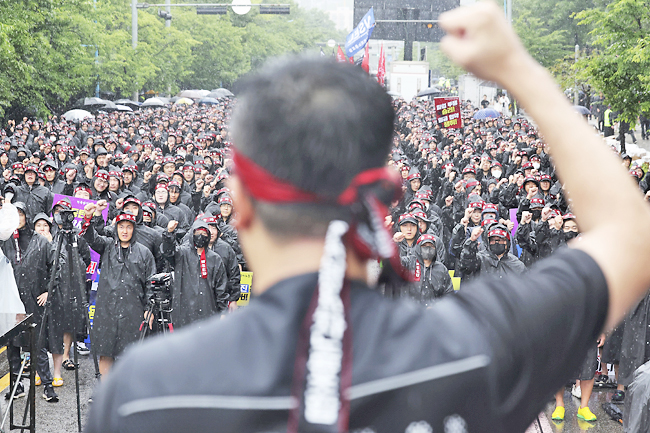SEOUL (AFP) – Thousands of South Korean workers at the world’s largest chipmaker, Samsung Electronics, have gone on an “indefinite” strike their union said will hit production of crucial high-tech semiconductors.
Here’s what we know:
WHAT’S GOING ON?
Workers, including some from Samsung Electronics’ foundry where the world’s most advanced computer chips are produced, walked off the job on Monday after months of negotiations with management stalled.
The National Samsung Electronics Union wants pay raises, a more transparent performance-based bonus system and an extra day off every year to mark the union’s founding in 2019.
It is the first indefinite strike in the history of Samsung – the largest of the chaebols, or family-run firms, that dominate the South Korean economy.
The company was actively anti-union for decades, with founder Lee Byung-chul declaring he would never allow them “until I have dirt over my eyes”. He died in 1987.
“Samsung is the hardest imaginable place to unionise and strike,” professor of Korean studies Vladimir Tikhonov at the University of Oslo told AFP.
“If Samsung workers succeed in this undertaking, it will empower the rest of South Korea’s labour.”
WHAT IS SAMSUNG’S RESPONSE?
Samsung has said the strike will not affect production, but experts said its staunch anti-union history means it is ill-equipped to defuse the standoff.
“Samsung has had no experience in resolving labour issues with its workers,” said activist and former lawmaker Chun Soon-ok, whose brother died by self-immolation in 1970 protesting brutal working conditions in the textile industry. Due to this “lack of understanding”, the company “needs to bring in someone with expertise in labour relations to find a way out of the current gridlock”, she added.
WILL IT HIT PRODUCTION?
With the world’s lowest birthrate and tightly controlled immigration, many South Korean companies including Samsung have long embraced factory automation, in part as a hedge against the looming demographic crisis.
The country has the highest robot density in the world, with one for every 10 employees – nearly 40 per cent more than runner-up Singapore, according to the International Federation of Robotics.
Even so, “Samsung must recognise that it can’t make chips without a labour force”, Chun said, adding that ever-intensifying competition in the sector made skilled workers essential.
WHAT ARE KOREAN FACTORIES LIKE?
South Korea’s factories may be high-tech, but its “industrial accident fatality rate is significantly higher than the OECD average”, said professor Kim Sung-hee at Korea University’s Graduate School of Labor Studies. This is due to a “failure to adequately address worker safety issues” because it is not the top priority for companies or the government, Kim told AFP.
There were more than 8,000 work-related deaths from 2020 to 2023, Labour Ministry data showed. Last month, 23 people were killed in a major fire at a South Korean lithium battery factory.
In Samsung’s semiconductor plants, workers have alleged that inadequate protection resulted in employees contracting cancer – something the company formally apologised for in 2014.
WHAT DO KOREANS THINK?
Labour organisation rates are low in South Korea, with only 13.1 per cent of wage earners belonging to unions, Seoul said.
In the 1970s and 1980s, labour groups were involved in the country’s pro-democracy movement, opposing the military-backed dictatorship. The unionised workers sometimes employed militant tactics, a legacy that still colours South Koreans’ perceptions, experts said.
According to a 2022 study by Hankook Research, 45 per cent of South Koreans still viewed union activities “negatively”.
“In cases like the Samsung strike, the public often perceives these union members as ‘greedy’ people demanding more benefits” despite already being well paid, professor Kim said.
Does Korea have a lot of strikes?
An ongoing strike by junior doctors against government training reforms is currently causing healthcare disruptions, and a huge strike last July briefly hit export-focused auto production.
Some strikes have seen violence: one at Ssangyong Motor in 2009 ended with a major police crackdown.
But the Samsung union’s action shows strike culture is evolving, said professor Lee Sang-min at Hanyang University.
“They are non-political compared to other unions, and are more open to trying new things,” Lee told AFP.
“If you look at general strike culture compared to the past, violent and illegal strikes have been greatly reduced, and legal and peaceful protests have taken place.”



